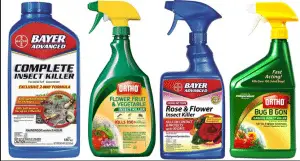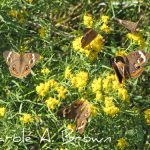Neonicotinoids are systemic pesticides that will kill the very pollinators you’re trying to attract to your wildlife garden.
A systemic pesticide is absorbed into all parts of the plant: leaves, flowers, pollen, and nectar which means that any caterpillar feeding on that plant, any butterfly sipping some nectar, or any native bee collecting pollen are often killed simply by visiting plants treated with neonicontinoids.
Neonicotinoids affect the central nervous system of insects resulting in paralysis and death, which is surely not your goal if you’re goal is to create a pollinator garden!
Now these chemicals are being discovered in many leading garden centers in plants that have been pre-treated with this toxic poison.
Neonicotinoids are a class of insecticides that are widely used in agriculture and horticulture to control pests such as aphids, mites, and whiteflies. They are called “neonicotinoids” because they are chemically similar to nicotine and work by affecting the nervous system of insects.
Neonicotinoids have become popular in recent years due to their systemic action, which allows the chemical to be absorbed into the plant tissue and provides protection from pests for the entire life of the plant. This makes them highly effective at controlling pests, but it also means that the chemicals can persist in the environment for long periods of time and can have unintended impacts on non-target species, including beneficial insects such as bees, butterflies, and other pollinators.
Studies have shown that neonicotinoids can have significant negative impacts on bee populations, particularly when the chemicals are used on flowering crops that bees rely on for food. Neonicotinoids can also contaminate the nectar and pollen of plants, which can harm bees and other pollinators that feed on the plants.
As a result of these concerns, several countries, including the European Union, have placed restrictions on the use of neonicotinoids. In the United States, the Environmental Protection Agency is currently reviewing the safety of neonicotinoids and has proposed restrictions on some uses of the chemicals.
Given the growing body of evidence linking neonicotinoids to declines in bee populations and other wildlife, it is important to be mindful of the potential impacts of these chemicals and to consider alternative pest management strategies that are less harmful to the environment and to non-target species.
More From Ecosystem Gardening:
Submit your review | |








